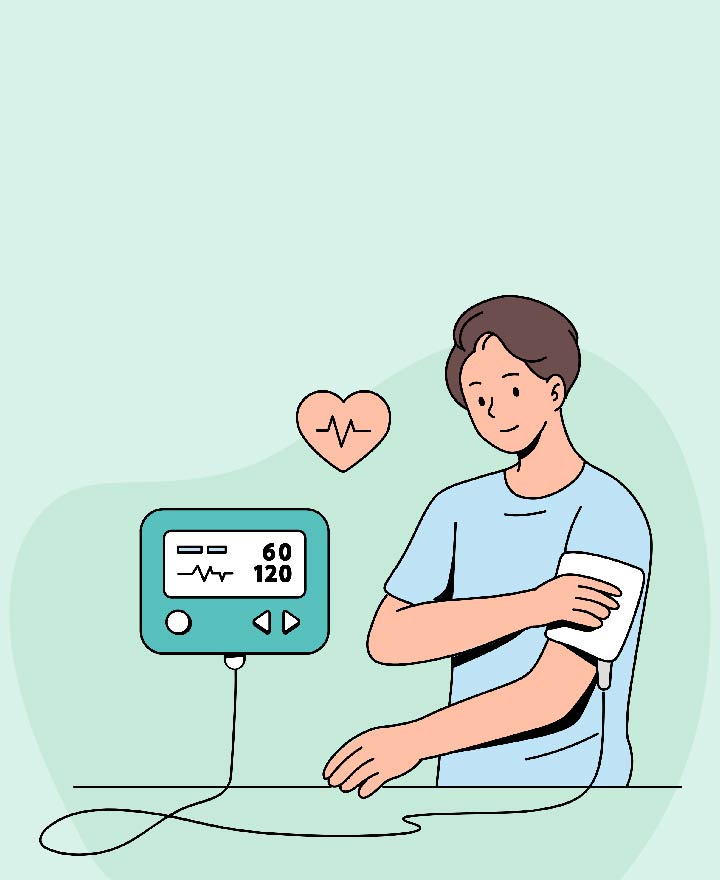

What do Blood Pressure Numbers mean?
Blood pressure readings are composed of two numbers and both numbers are an important part of your blood pressure reading. The top number of the reading is referred as systolic pressure and it measures the pressure in your arteries when the heart beats. The bottom number is referred as diastolic pressure and it measures the pressure in your arteries between each heartbeat. The unit of measure for blood pressure is mm Hg which is millimeters of mercury.
Normal Blood Pressure for Adults
According to the American Heart Association (AHA), normal blood pressure for adults (ages 20 and older) is less than 120/80 mm Hg.
Average Blood Pressure by Age
Blood pressure tends to rise as you get older because your blood vessels tend to become stiffer, and plaque (a fatty material) can build up in them. If your blood pressure becomes too high, you're at a greater risk for heart disease, strokes, and more.
According to several researchers, the blood pressure by age is as follows:
For Men:
1. 18-39 years – 119/70 mm Hg
2. 40-59 years – 124/77 mm Hg
3. 60+ years – 133/69 mm Hg
For Women:
1. 18-39 years – 110/68 mm Hg
2. 40-59 years – 122/74 mm Hg
3. 60+ years – 139/68 mm Hg
Blood Pressure Stages
In case of high blood pressure, the blood pressure is divided into stages and at each stage, there is a greater risk to your health. The 4 stages of high blood pressure are:
• Elevated : Systolic is 120-120mm Hg/ Diastolic is less than 80mm Hg
• Stage 1 hypertension : Systolic is 130-130 mm Hg/ Diastolic is 80-89 mm Hg
• Stage 2 hypertension : Systolic is 140 mm Hg and up / Diastolic is 90 mm Hg and up
• Hypertensive crisis : Systolic is 180 mm Hg and up / Diastolic is 120 mm Hg and up
When to call your healthcare provider?
Blood pressure above 180/120 mm Hg requires immediate medical attention. Call the doctor even if you experience any of the following symptoms – chest or back pain, difficulty speaking, shortness of breath, vision change, and weakness.
Conclusion
Blood pressure is one indicator of a person’s heart health. If the pressure is too high, it can lead to serious health complications and potentially death.
Though not all causes of elevated blood pressure are preventable, a person can reduce their risk of complications by managing their lifestyle and minimizing risk factors for developing high blood pressure.
One of the important components of our overall wellness is also being financially secured. Healthcare emergencies can happen any time, but a good health insurance policy can protect you from such uncertain situations. To know more about it, click here
Source: CDC.Gov, Healthline, MedicalNewToday
Disclaimer: This blog provides general information and discussions about health and related subjects. The information and other content provided in this blog, website or in any linked materials are not intended and should not be considered, or used as a substitute for, medical advice, diagnosis or treatment. Kindly contact your Doctor before starting a new medicine or health regime.
Related Articles
Common blood tests done during pregnancy
Emergency treatment for high BP at home
Health consequences of iodine deficiency
Blood Circulation – Importance and Ways to Boost It
Changes you can make to manage high blood pressure
Published on June 08, 2023

















 Health Insurance
Health Insurance  Travel Insurance
Travel Insurance  Car Insurance
Car Insurance  Cyber Insurance
Cyber Insurance  Critical Illness Insurance
Critical Illness Insurance
 Pet Insurance
Pet Insurance
 Bike/Two Wheeler Insurance
Bike/Two Wheeler Insurance  Home Insurance
Home Insurance  Third Party Vehicle Ins.
Third Party Vehicle Ins.  Tractor Insurance
Tractor Insurance  Goods Carrying Vehicle Ins.
Goods Carrying Vehicle Ins.  Passenger Carrying Vehicle Ins.
Passenger Carrying Vehicle Ins.  Compulsory Personal Accident Insurance
Compulsory Personal Accident Insurance  Travel Insurance
Travel Insurance  Rural
Rural